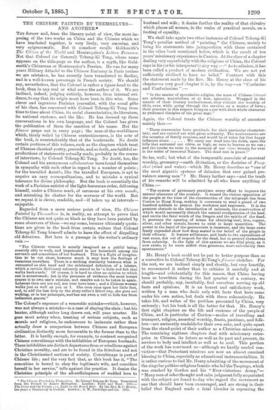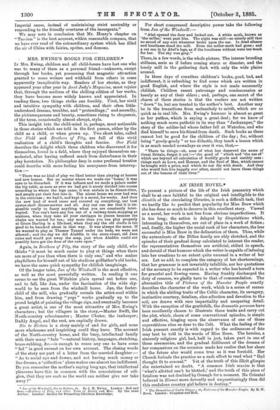THE CHINESE PAINTED BY THEMSELVES— AND ANOTHER.* THE former and,
from the literary point of view, the more im- posing of the two works on China and the Chinese which we have bracketed together, is very lively, very amusing, and very epigrammatic. But it somehow recalls Goldsmith's
The Citizen of the World and Montesquieu's Lettres Persanes. Not that Colonel (or General) Tcheng-Ki Tong, whose name appears on the title-page as the author, is a myth, like Gold- smith's Chinaman or Montesquieu's Persian. He was for many years Military Attache to the Chinese Embassy in Paris (unless we are mistaken, he has recently been transferred to Berlin), and is a well-known personage in French society. We should say, nevertheless, that the Colonel is rather a figure-head to the book, than in any real or vital sense the author of it. We are inclined, indeed, judging entirely, however, from internal evi- dence, to say that its origin must have been in this wise. Some clever and ingenious Parisian journalist, with the usual gifts of his class, has conversed with Colonel Tcheng-Ki Tong from time to time about China, its social characteristics, its literature, its national customs, and the like. He has dressed up these conversations in his own language, and the Colonel has given the publication of them the sanction of his name. But the fkineur peeps out in every page ; the man-of-the-worldliness which, thinly veiled by Chinese sententiousness, is the note of the book, is unmistakeably that of the boulevards. No doubt certain portions of this volume, such as the chapters which treat of Chinese classical poetry, proverbs, and so forth, are faithful re- productions of statements actually made, probably in the course of interviews, by Colonel Tcheng-Ki Tong. No doubt, too, the Colonel and his anonymous collaborateur have found themselves in sympathy with each other in regard to a number of points ; for the travelled Asiatic, like the travelled European, is apt to acquire an easy cosmopolitanism, and to mistake a cynical tolerance for divine philosophy. But the book is essentially the work of a Parisian satirist of the light-horseman order, delivering himself, under a Chinese mask, of sarcasms at his own monde, and mistaking its chatter for the murmur of the world. But we repeat it is clever, readable, and—if taken up at intervals— enjoyable.
Regarded from a more serious point of view, The Chinese Painted by Themselves is, in reality, an attempt to prove that the Chinese are not quite so black as they have been painted by some observers of them—we say some, because ultimately quota-
tions are given in the book from certain writers that Colonel Tcheng-Ki Tong himself admits to have the effect of dispelling old delusions. Bat here is a passage in the writer's ordinary vein :—
"The Chinese woman is usually imagined as a pitiful being, scarcely able to walk, and imprisoned in her household among the servants and concubines of her husband. This is a flight of imagina- tion to be cut short, however much it may hurt the feelings of veracious travellers. There is a striking similarity between what is recounted on this head and the celebrated definition of a lobster, which a certain dictionary solemnly stated to be a little red fish that walks backwards.' Of course, it is hard to alter an opinion to which one is accustomed ; but in the presence of evidence the most honest coarse is to own one's mistake, and resolve not to be taken in again. Lobsters then are not red, nor ever have been ; and a Chinese woman walks just as well as you or I. She even runs upon her little feet, and, to add the last drop to the story-teller's bitter cup, she goes out walking, or in her palanquin, and has not even a veil to hide her from indiscreet gazers."
The Colonel's exposure of a venerable mistake—which, however, was not always a mistake—is a case of slaying the slain ; but his banter, although rather long drawn out, will pass muster. He goes most astray when, treating of serious subjects, such as morals and religions, he endeavours to insinuate rather than actually draw a comparison between Chinese and European civilisation distinctly more favourable to the former than to the latter. It is hardly enough, for example, to contrast recognised Chinese concubinage with the infidelities of European husbands. These infidelities are distinct departures from or rebellions against Christian morality, and are to be found in the frivolous and not in the Christianised sections of society. Concubinage is part of Chinese life ; and the very fact that, as this book has it, "The concubine is bound to obey the legitimate wife, and considers herself in her service," tells against the practice. It denies the Christian principle of the all-nrfficingness of wedded love to
* The Chinese Painted by Thesnselves. By Colonel Toheng-Ki Tong. Translated from the French by James Millington. London : Yield and Taer. 1885.— The Cross and the Dragon ; or, Light in the Broad Bast. By the Rev. B. C. Henry, ten years a Missionary in Canton. London : S. W. Partridge and Co. 1885.
husband and wife ; it denies further the reality of that chivalry which places all women, in the realm of practical morals, on a footing of equality.
We shall take again two other instances of Colonel Tcheng-Ki Tong's peculiar method of " painting " the Chinese, mainly to bring his statements into juxtaposition with those contained in the other book mentioned below, which is the result of ten years' missionary experiences in Canton. At the close of a chapter dealing very superficially with the religions of China, the Colonel says in his (or his interpreter's) airy way :—" As to atheism, it has been called a product of modern civilisation. We are not yet sufficiently civilised to have no belief." Contrast with this the statement made by the Rev. Mr. Henry at the close of his chapter—a very good chapter it is, by the way—on "Confucius and Confucianism " :—
" In the matter of speculative religion, the mass of Chinese literati are atheists, materialists, or at best, agnostics. Wrapped in the mantle of their literary exclusiveness, they ridicule the worship of idols, even while going through the services as a matter of form ; their practice in this respect being on a par with their whole character as professed disciples of the great sage."
Again, the Colonel treats the Chinese worship of ancestors mainly thus :— " These ceremonies have gratitude for their particular character- istic, and are carried out with great solemnity. The anniversaries are the occasion of family reunions, and would be of value for that happy
influence alone We carry our dead into the fields, upon the hills that surround our cities, as high, as near to heaven as we can ; and the tombs we raise to the memory of our rieux remain for ever in the midst of immortal Nature. The dead rest in peace !"
So far, well ; but what of the inseparable associate of ancestral worship, geomancy—earth divination, or the doctrine of Fung- shui (wind and water)—which Mr. Henry describes as "one of the most gigantic systems of delusion that ever gained pre- valence among men " ? Mr. Henry further says—and the truth of his remarks will be admitted by all who know anything of China :— " The system of geomancy paralyses every effort to improve the natural resources of the country. It roused the violent opposition of the people at the time of the construction of the telegraph line from Canton to Hong Kong, making it necessary to send a guard of two hundred soldiers to protect the workmen and engineers. It is the greatest obstacle to the introduction of railroads, the construction of which would necessarily disturb the natural configuration of the land, and excite the fatal wrath of the Dragon and the spirits of the dead. It prevents the opening of mines for obtaining coal, iron, copper, silver, and other metals, known to exist in large quantities. The power in the hand of the geomancers is immense, and the large sums freely expended slow how deep seated is the belief of the people in their efficacy. It fosters selfishness, and leads to the expenditure of vast sums, not out of respect for the dead, but to protect themselves from calamity. In the light of this system we see filial piety, as it now exists, to be more selfish than generous, more calculating than spontaneous."
Mr. Henry's book could not be put to better purpose than as a corrective to Colonel Tcheng-Ki Tong's ficineur sketches. For the rest, we are inclined simply and shortly, but very heartily, to recommend it rather than to criticise it carefully and at length—and substantially for this reason, that China having been so bewritten daring the last quarter of a century, we should probably, nay, inevitably, find ourselves serving up old facts and opinions. It is an honest and satisfactory work, written by a man who deals only with facts that have come under his own notice, but deals with these exhaustively. He takes life, and writes of the problem presented by China, very seriously ; but his book is all the better for that. Mr. Henry's first eight chapters on the life and customs of the people of China, and in particular of Canton—modes of travelling and transport, religion, ancestral worship, feasts, pastimes, and folk- lore—are eminently readable for their own sake, and quite apart from the stand-point of their author as a Christian missionary. The remaining eighteen chapters deal with missionary enter- prise in Chinese, its future as well as its past and present, its services to body and intellect as well as to soul. This portion of the work has convinced us—although we hardly needed con- viction—that Protestant missions are now an almost unmixed blessing to China, especially as educational instrumentalities. It is rather curious to find Mr. Henry admitting of the movement of the singular politico-religious fanatic who led the Taepings, which was crushed by Gordon and his "Ever-victorious Army,"-- " Many men of sober thought and calm judgment fully acquainted with the subject are found to-day who regard the movement as one that should have been encouraged, and are strong in their belief that England made a fatal blunder in espousing the
Imperial cause, instead of maintaining strict neutrality or responding to the friendly overtures of the insurgents."
We may note in conclusion that Mr. Henry's chapter on " Tao-ism " is the best account, within reasonable compass, that we have ever read of the extraordinary system which has filled the air of China with fairies, sprites, and demons.















































 Previous page
Previous page